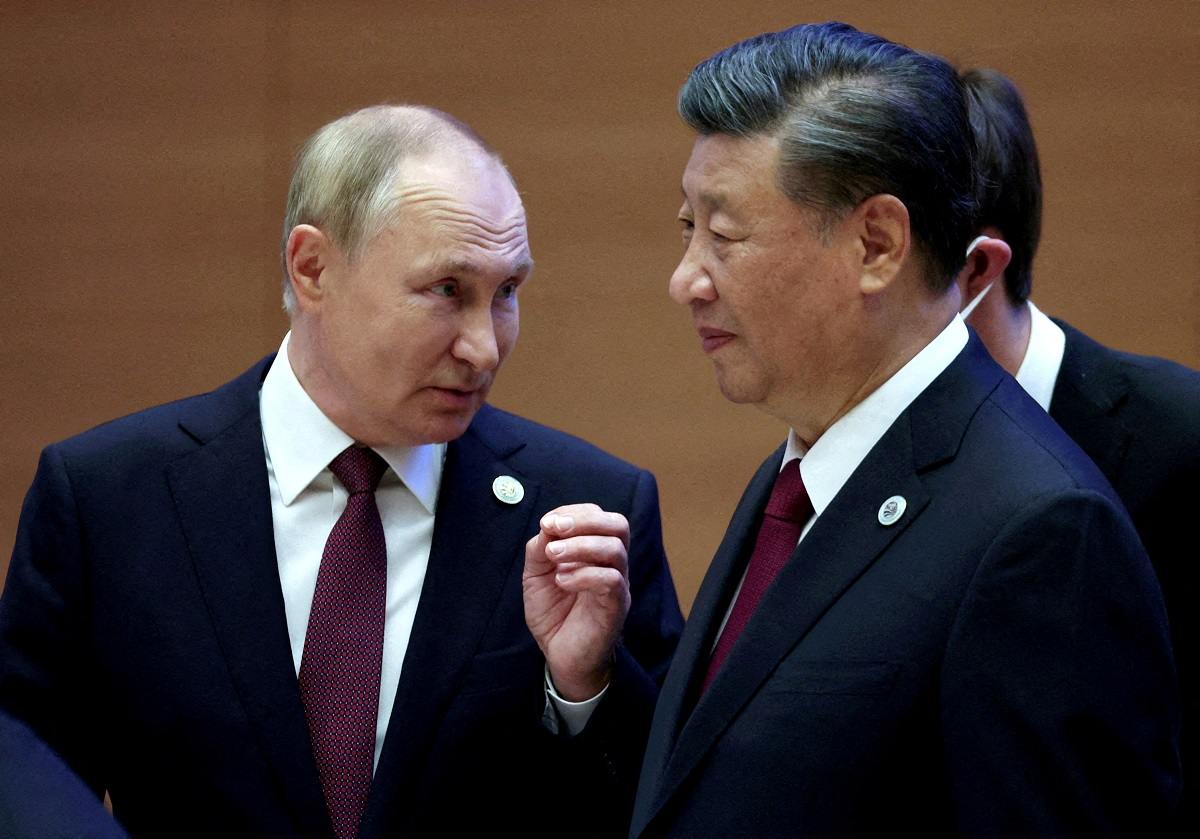
Russian President Vladimir Putin speaks with Chinese President Xi Jinping before an extended-format meeting of heads of the Shanghai Cooperation Organization summit (SCO) member states in Samarkand, Uzbekistan September 16, 2022.
13:02 JST, March 20, 2023
RIGA, Latvia – For Vladimir Putin, the state visit to Russia by Chinese President Xi Jinping, which begins on Monday, provides a giant morale boost and a chance to showcase the much-vaunted new world order that the Russian leader believes he is forging through his war on Ukraine – in which the United States and NATO can no longer dictate anything to anyone.
Xi’s visit to Russia, just after cementing his precedent-breaking third term in power, brings together two men who have positioned themselves as leaders for life – and it sets the scene for global confrontation, with Beijing willing to use its partnership with Moscow to counter Washington, even if that means granting tacit approval to Putin’s brutal, destabilizing war.
“The grim outlook in China is that we are entering this era of confrontation with the U.S., the gloves are off, and Russia is an asset and a partner in this struggle,” said Alexander Gabuev, an analyst with the Carnegie Endowment for International Peace.
It remains to be seen whether this confrontation will heat up, pushing three nuclear powers to the brink of World War III, or merely marks the opening chords of Cold War 2.0. But Xi’s visit shows sides being taken, with China, Russia and Iran lining up against the United States, Britain and other NATO allies – in a competition for global influence and for alliances with nations such as South Africa and Saudi Arabia, which seem ambivalent but up for grabs.
In an article published Sunday evening in China’s People’s Daily, Putin gushed about the brotherly friendship between Russia and China, which he said were standing “shoulder to shoulder,” including against Western hegemony.
“Sticking more stubbornly than ever to its obsolete dogmata and vanishing dominance, the ‘Collective West’ is gambling on the fates of entire states and peoples,” Putin wrote. “The U.S.’s policy of simultaneously deterring Russia and China, as well as all those who do not bend to the American dictation, is getting ever more fierce and aggressive.” He also warned that NATO is “seeking to penetrate the Asia-Pacific.”
Xi’s trip, billed in Russia as the signature diplomatic event of 2023, could hardly come at a more useful moment for Putin. With his invasion largely stalled, military casualties mounting, and his personal reputation newly stained by an arrest warrant for war crimes issued by the International Criminal Court, Putin is in desperate need of a distraction that props him up.
For the Russian domestic audience, the ceremonial pomp of hosting the Chinese leader will reinforce Putin’s image as a modern-day czar. Crowning the visit, a state dinner will be held in the spectacular 15th-century stone Faceted Chamber in the Kremlin, Moscow’s oldest building, constructed by Ivan III, the grand prince of Moscow, whose reputation as a “gatherer of lands” for annexing neighboring territories inspires Putin.
Given rampant second-guessing of Putin’s military strategy, the display of China and Russia as allies against the United States will also lend credibility to Putin’s assertions that the Ukraine war is the crucible by which Russia is creating the new post-American order.
As the Chinese president lands in Russia, amid Putin’s feverish anti-Western rhetoric, the world is at a dangerous crossroads. The Russian leader has suspended New START, the only remaining arms control accord with Washington, and has staked his country’s future on what is now likely to be a long, unpredictable war, despite the staggering economic costs and misgivings of his own elite. The West, in turn, is sending more powerful arms to Ukraine, including tanks and fighter jets.
The alignment of authoritarian leaders may see the world divided into opposing camps for decades, stymieing cooperation on climate change, choking global action on human rights abuses, paralyzing international institutions and increasing tensions in contested regions.
But while Putin is searching for allies who can send weapons, boost trade or at least support him in global forums, for Xi, the visit seems more about positioning Beijing globally than about Russia or Ukraine, said Aleksei Chigadayev, a China analyst at Leipzig University and former lecturer at Moscow’s Higher School of Economics who left Russia because of the invasion.
“It’s a demonstration to the world, ‘We can mediate in international conflicts, and we are a reliable partner,'” Chigadayev said of Xi’s visit.
It is also a warning, he said, to Washington on the need to negotiate with Beijing and to Europe on China’s importance as a major global power. He added that the visit sends a message to Central Asia, Africa and the Middle East that China is a more viable source of support than the United States.
Xi may also be intent on demonstrating to Putin that if there is a new world order, then China will lead it.
China recently displayed rising global influence by mediating a diplomatic rapprochement between Iran and Saudi Arabia, amid Washington’s annoyance with Saudi Crown Prince Mohammed bin Salman over his support for Putin’s efforts to keep oil prices high so that he can bankroll the war.
Although China portrays itself as a neutral party when it comes to Putin’s war in Ukraine, the Kremlin sees Xi as its strongest tacit supporter.
Beijing refuses to condemn the invasion, has blamed the United States for the war and criticizes Western sanctions designed to starve Putin’s war machine of funds. With Russia’s economy under intense pressure, China last year kept it afloat, boosting trade with Russia – including a sharp increase in Chinese exports of electronic chips that Moscow needs for weapons production – and a steep rise in purchases of Russian oil.
Russian presidential aide Yury Ushakov boasted on Friday that Russia and China would reach their 2024 target for $200 billion in trade turnover a year early, in 2023, and he extolled the two leaders’ “especially warm and trusting personal relationship.”
One key question, as part of the growing global confrontation, is whether Beijing will offer Putin weapons, potentially via a clandestine route such as North Korea. The United States has warned Beijing not to do so, stirring outrage among senior Chinese officials who accused Washington of glaring “hypocrisy” given the huge flow of U.S. weapons to Kyiv.
China has called for a cease-fire between Ukraine and Russia and the opening of peace talks as part of a 12-point proposal, and Ukrainian President Volodymyr Zelensky has expressed willingness to speak to Xi. But the plan seems to have no chance at success, largely because it does not address Russia’s occupation of Ukrainian territory.
The Kremlin claims to be giving the proposal “great attention” while insisting there can be no peace until Ukraine accepts “new realities,” an apparent reference to Russia’s illegal annexation of Ukrainian territory. Zelensky, in turn, has pledged to retake all occupied lands, including Crimea.
“All of Moscow’s demands are well known. The de facto situation and new realities are also well known,” Kremlin spokesman Dmitry Peskov said Tuesday.
No matter how thin the plan, Xi can posture globally by noting that China is the only member of the U.N. Security Council with a peace plan, while echoing Putin’s line that NATO weapons supplies to Ukraine will only exacerbate tensions.
Xi’s visit comes as Moscow and Tehran have drawn much closer, with Russia relying on Iran for self-detonating drones to attack Ukrainian cities. Meanwhile, hope has faded for a resuscitation of the Iran nuclear deal, known as the Joint Comprehensive Plan of Action, raising a risk that Iran will soon acquire nuclear weapons, further destabilizing global security.
Putin and Xi have much in common: their own self-serving definitions of democracy and market economics; a disdain for human rights; a fear of civic engagement by the general public; and, most of all, a desire to end U.S. global dominance and to reshape international organizations and norms to suit Russian and Chinese interests.
The dinner in the Faceted Chamber will highlight how, three decades after the Cold War ended, a new ominous era seems at hand. In that same room in 1988, Ronald Reagan exchanged toasts with Mikhail Gorbachev while on a state visit in which the U.S. president declared the Cold War over and dismissed his 1983 description of the Soviet Union as an “evil empire” as words spoken in “another time, another era.”
Washington and Moscow now seem to have come full circle. But unlike the last Cold War, when there was a Sino-Soviet split over ideological differences, China now looks set to confront the United States and Europe with Russia by its side.
China is increasingly pessimistic about relations with Washington, Gabuev said, and with growing leverage over a weakening Russia, has decided to cement the relationship.
Beijing observed Washington’s red lines on Western sanctions on Russia, Gabuev noted, only to see Washington slap on export controls restricting China’s ability to obtain high-end semiconductors, while also sending Taiwan more weapons.
As Putin faces an arrest warrant over war crime charges in the International Criminal Court, Xi’s visit is an important symbolic boost, demonstrating that he retains a powerful friend, despite being shunned by the West.
Xi’s support further legitimizes Putin’s position in Russia, where the population still supports his war, and signals to leaders in Africa, the Middle East, Asia and Latin America that Putin is a man with whom it is worth continuing to do business.
In Moscow, officials are playing down Putin’s supplicatory position. But Russia’s weakened hand only stands to atrophy in years to come as its economy stagnates under sanctions, cut off from global technology and supply chains.
Such a decline suits Chinese interests, but Beijing also wants to prevent a Russian collapse in the war that could trigger the fall of Putin’s regime, thereby strengthening the United States and perhaps ushering in a period of chaos and uncertainty along the 2,600-mile-long border between Russia and China.
Alexey Maslov, director of the Moscow State University Institute of Asian and African Studies, said the new confrontational era “will be a long-lasting cold war between different camps.”
The fragmentation and disruption will hamper not just China, Russia and Iran but also the United States and Europe, he said: “The world will be less comfortable for trade, for education, for any kind of negotiations, for the next 20 or 25 years.”
Top Articles in News Services
-

Survey Shows False Election Info Perceived as True
-

Hong Kong Ex-Publisher Jimmy Lai’s Sentence Raises International Outcry as China Defends It
-

Japan’s Nikkei Stock Average Touches 58,000 as Yen, Jgbs Rally on Election Fallout (UPDATE 1)
-

Japan’s Nikkei Stock Average Falls as US-Iran Tensions Unsettle Investors (UPDATE 1)
-

Trump Names Former Federal Reserve Governor Warsh as the Next Fed Chair, Replacing Powell
JN ACCESS RANKING
-

Producer Behind Pop Group XG Arrested for Cocaine Possession
-

Japan PM Takaichi’s Cabinet Resigns en Masse
-

Japan Institute to Use Domestic Commercial Optical Lattice Clock to Set Japan Standard Time
-

Man Infected with Measles Reportedly Dined at Restaurant in Tokyo Station
-

Israeli Ambassador to Japan Speaks about Japan’s Role in the Reconstruction of Gaza
























